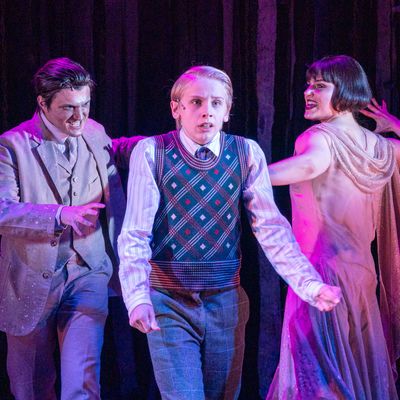
There’s only one shocking moment in Duncan Sheik and Kyle Jarrow’s listless new musical Whisper House. Ideally, we would be spending more of the musical with our hearts in our throats (as opposed to our eyes on our watches): It’s supposedly a thriller, with two homicidal ghosts wafting around. But sadly there are no intentional scares in this show — neither the creeping, existential sort, nor the jump-at-a-loud-sound sort. Even the everyday horrors, the way that people disappoint each other, fail to raise a single goosebump. At one point, though, a character deliberately breaks a lovely prop, and the audience gasps. That object had value, you could hear everyone thinking, and he shouldn’t just chuck it around.
Indeed, Whisper House is haunted by a sense of waste. Too little happens in its hour and a half, though there seems to be plenty of plot material. The set-up is promising: In 1942, a bereaved little boy, Christopher (Wyatt Cirbus), comes to live with his crotchety aunt, Lily (Samantha Mathis), who runs a lighthouse on the Maine coast. His aunt’s hired man, Yasuhiro (James Yaegashi), is Japanese, which means he is hated by the local sheriff (Jeb Brown), feared by the xenophobic Christopher, and in immediate danger of being swept away by the wartime government’s treatment of “enemy aliens.” Lighthouses are weird, liminal places, as are theaters, as are minds in grief and isolation. Yet Whisper House spends strangely little time exploring these intriguing shores, instead hustling the thinly drawn Christopher into a misunderstanding over Yasuhiro’s motives as fast as it can. Is the Japanese man a spy or is he staying near Lily for more personal reasons? The question is asked, and then immediately answered.
It’s a start-and-stop show, full of hasty storytelling that nonetheless feels very slow. Jarrow and Sheik can’t seem to stop interrupting themselves: After every short scene, two singing ghosts (Alex Boniello and Molly Hager) ooze onstage and gloat about how bad everyone is feeling. They’re a nasty pair of narrators, sneering lyrics at us like, “they’d all be better off dead” while doing enough mischief to keep the group at odds. The ectoplasmic duo wear sea-stained 1920s evening clothes, and although we learn they were shipwreck victims, we know very little about what has condemned them to ghost status. Whatever sin it was (maybe not confessing their love to each other? That comes up once), they’re now doing their darnedest to lure Christopher to his own watery grave. The two singers have lovely voices, but I started to dread the sight of them, since it meant the narrative was about to jolt to a halt again. A full hour after we’ve met the undead, is it really necessary to interject stuff like this?
We’re here to tell you
That all of this is real
And if you’re terrified today
That’s how you’re supposed to feel
(For real)
Who is the “you” in this lyric? They’re singing to an audience that is definitely not scared of them. With their wiggle-armed wraith choreography by Billy Bustamante and dilatory dramaturgical tactics, these non-characters do more damage to the mood of the piece than a U-boat does to a troop carrier. To earn its otherworldliness, Whisper House needs a spooky atmosphere, and the ghosts should be just the creatures to provide it. But they undercut the mood every time, their Beetlejuicily blithe attitude removing us from the fate of little Christopher and even Yasuhiro, who soon eclipses the others as the protagonist to watch.
Jarrow wrote the book and co-wrote the lyrics; Sheik also wrote lyrics and took care of the often lush compositions; the Civilians artistic director Steve Cosson directs. Among these men, there’s almost 100 years of experience, but they seem rushed and out of step with one another here. Jarrow’s wryness seems at war with Sheik’s musical instincts, and Cosson stages the piece with a level of abstraction that’s ultimately unhelpful. Set designer Alexander Dodge cleverly uses strips of hanging grey fabric to suggest the inside curve of a lighthouse, but otherwise the world is barely realized. When two characters fall in the ocean (in the winter, in Maine), they pop back out again, warm and totally dry. It’s no wonder the actors seem so disconnected from their environment: The show doesn’t even believe in the sea.
It’s easy, though, to imagine what the creative team wanted to do here. Close your eyes during Whisper House and you hear a hint of it — a play that has to strain to be heard over the storm, a musical that’s half musicians, half rain. The original bones are good: Jarrow and Sheik have come up with characters whose natural state is to be fearful and waiting, all of them watching for living enemies, none of them able to see the more dangerous dead all around them. Imagine the songs those people could sing! The pressure of condensing their stories into 90 minutes, though, has left no room for stillness, or elaboration, or fear. When we should be waiting in terror with them, we’re instead watching two ghosts do a snide Charleston of revenge. That’s horrifying, certainly, but not in the way one hopes.
Whisper House is at 59E59 through February 6.


